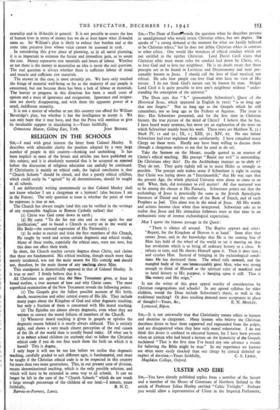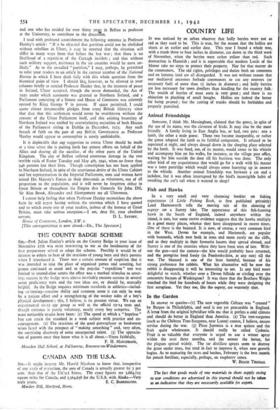ULSTER AND EIRE
Snt,—You have already published replies from a member of the Senate and a member of the House of Commons of Northern Ireland to the article of Professor Julian Huxley entitled "Celtic Twilight." Perhaps you would allow a representative of Ulster in the Imperial Parliament, and one who has resided for over thirty yea Is in Belfast as professor at the University, to contribute to the discuss on.
I read with profound astonishment the following sentence in Professor Huxley's article: " If it be ob;eeted that partition could not be abolished without rebellion in Ulster, it raay be retorted that the situation will differ in many ways from that before the last war ; that there is no likelihood of a repetition of the Curragh incident ; and that without such military support, resistance in the six counties would be most un- likely." As to the so-called "partition," I may, perhaps, be permitted to refer your readers to an article in the current number of the National Review in which I have dealt fully IA ith this whole question from the historical point of view. I should like, however, to he allowed in your columns briefly to remind Professor Huxley that, in the interests of peace in Ire:and, Ulster accepted, though she never demanded, the Act of 1920 under which autonomy was granted to Northern Ireland, and a Parliament consisting of a Senate and House of Commons was solemnly opened by King George V in person. If space permitted, I could quote almost innumerable pledges from every British Ministry since that date that this settlement would never be overthrown without the consent of the Ulster Parliament itself, and this existing boundary of Northern Ireland was ratified by overwhelming majorities of both Houses of the Parliament sitting in Dublin in December, 1925. Any such breach of faith on the part of any British Government as Professor Huxley would appear to contemplate is surely unthinkable.
It is deplorable that any suggestion to coerce Ulster should be made at a time when she is putting forth her utmost efforts on behalf of the Allies and sharing all the sacrifice, of the other parts of the United Kingdom. The city of Belfast suffered enormous damage in the two terrible raids of Easter Tuesday and May 4th, 1941, when no fewer than 946 persons lost their lives. Though conscription has not been applied to Northern Ireland, in spite of the unanimous desire of the Ulster Cabinet and her representatives in the Imperial Parliament, men and women have joined His Majesty's Forces in their thousands as volunteers, out of all proportion to the population, and it will never be forgotten either in Great Britain or throughout the Empire that Generals Sir John Dill, Sir Alan Brook, Alexander and Montgomery are all Ulstermen.
I cannot help feeling that when Piofessor Huxley reconsiders the above facts he will regret having written the sentence which I have quoted and to which every one of your readers, jealous of the honour of Great Britain, must take serious exception.—I am, dear Sir, your obedient
[This correspondence is now closed.—ED., The Spectator.]



























 Previous page
Previous page